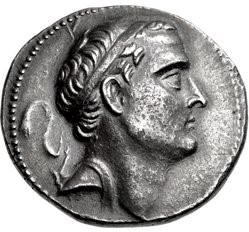Seleucus IV Philopator facts for kids
Quick facts for kids Seleucus IV Philopator |
|
|---|---|
| Basileus | |

Silver tetradrachm of Seleucus IV, minted in Ptolemais-Ake, featuring a portrait of Seleucus on the obverse. SC 1331a
|
|
| Basileus of the Seleucid Empire | |
| Reign | 3 July 187 – 3 September 175 BC |
| Predecessor | Antiochus III the Great |
| Successor | Antiochus |
| Born | c. 218 BC |
| Died | 3 September 175 BC (aged 42–43) |
| Spouse | Laodice IV |
| Issue | Antiochus Demetrius I Soter Laodice V |
| Dynasty | Seleucid |
| Father | Antiochus III the Great |
| Mother | Laodice III |
Seleucus IV Philopator (born around 218 BC, died September 3, 175 BC) was a king of the Seleucid Empire. This was a large kingdom in ancient times. He ruled from 187 BC to 175 BC. His kingdom included areas like Syria, Mesopotamia, Babylonia, and parts of Iran.
Contents
Biography of Seleucus IV
Early Life and Family
Seleucus IV was the second son of Antiochus III the Great and Laodice III. He became king after his father. Seleucus IV married his sister, Laodice IV. They had three children together. These were two sons, Demetrius I Soter and Antiochus, and a daughter named Laodice V.
War with Rome
Before the war between the Seleucid Empire and the Roman Republic began, Seleucus was given an important job. His father put him in charge of a city called Lysimacheia. When the war started, Seleucus led his own army. He tried to capture the city of Pergamon but was not successful. He did manage to take the city of Phocaea.
Seleucus also fought alongside his father in the important Battle of Magnesia. After their defeat in this battle, Seleucus was made a co-ruler with his father in 189 BC. The Seleucids then signed a peace agreement with Rome. This was called the Treaty of Apamea in 188 BC. As part of this treaty, Seleucus helped the Roman and Pergamene armies. He made sure they had enough food and scouts during their fight against the Galatians.
Time as King
In 187 BC, Seleucus's father, Antiochus III, died. He passed away after taking treasures from a temple in Elymaïs. Seleucus then became the new king, or Basileus. He made a new agreement with the Achaean League. He almost joined a war against Galatia, but he changed his mind.
Seleucus also had to send a hostage to Rome as part of the peace treaty. Instead of sending his brother, Antiochus IV Epiphanes, he sent his own son, Demetrius. This was a big decision for the kingdom.
How Seleucus IV Died
On September 3, 175 BC, Seleucus was killed. He was assassinated by Heliodorus, who was one of his main officials. The old stories do not say why Heliodorus did this. Maybe he wanted power for himself. Or perhaps the stories blamed him because he was the one who gained the most from the king's death.
Heliodorus took control of the kingdom for a short time. He ruled on behalf of Seleucus IV's young son, Antiochus. However, Heliodorus's rule did not last long. A few months later, Antiochus IV, Seleucus's brother, took over with help from Pergamon.
Seleucus IV in Religious Texts
The book of 2 Maccabees talks about Seleucus IV. This is a Jewish text that Christians later included in their holy books. In 2 Maccabees 3, it says that Seleucus IV sent Heliodorus to collect taxes. He heard a very large report about the wealth in the Second Temple in Jerusalem.
Heliodorus tried to take the treasures from the Temple. But he was stopped by angels in a miraculous event. This story is also mentioned in the Book of Daniel. It says that Seleucus "will send out a tax collector to maintain the royal splendor." This collector is also called an "extortioner" or a "collector of tribute."
What Historians Say
Many ancient writers who were not religious often described Seleucus IV as a weak ruler. However, some modern historians, like Lester L. Grabbe, suggest this might not be fair. These historians often expected kings to be constantly at war.
Seleucus IV seems to have led a peaceful time of rebuilding for his kingdom. He managed his relationship with Rome very well. This was important because the Seleucid Empire was in a weaker position after losing the war with Rome. A decade of peace allowed the Seleucid Empire to become strong again.
See also
 In Spanish: Seleuco IV Filopátor para niños
In Spanish: Seleuco IV Filopátor para niños
- List of Syrian monarchs
- Timeline of Syrian history
 | James Van Der Zee |
 | Alma Thomas |
 | Ellis Wilson |
 | Margaret Taylor-Burroughs |

